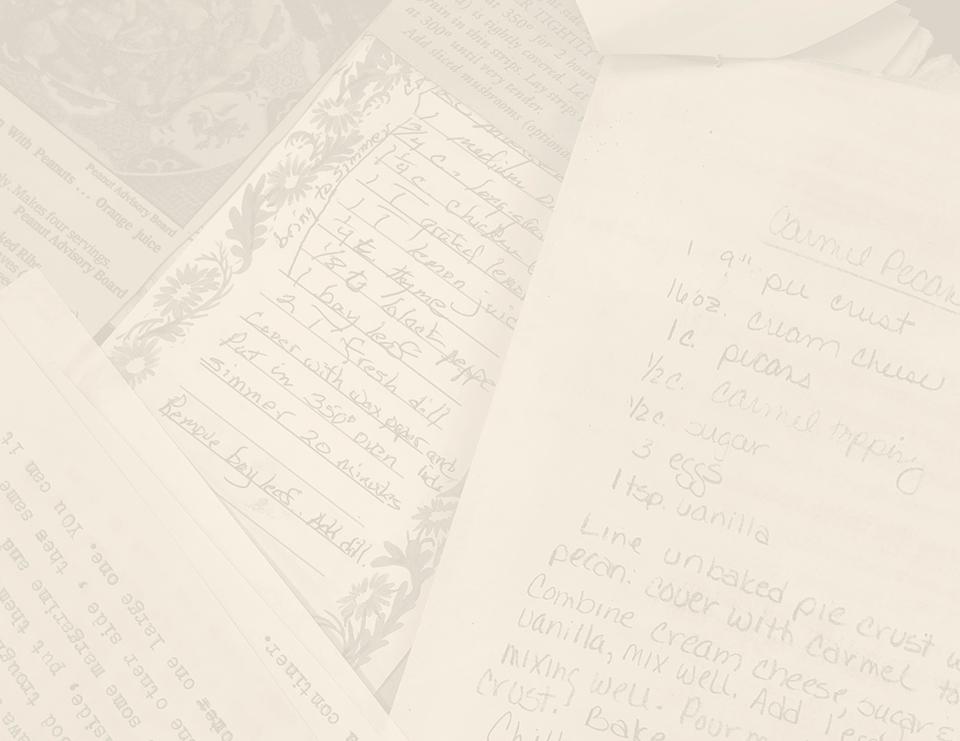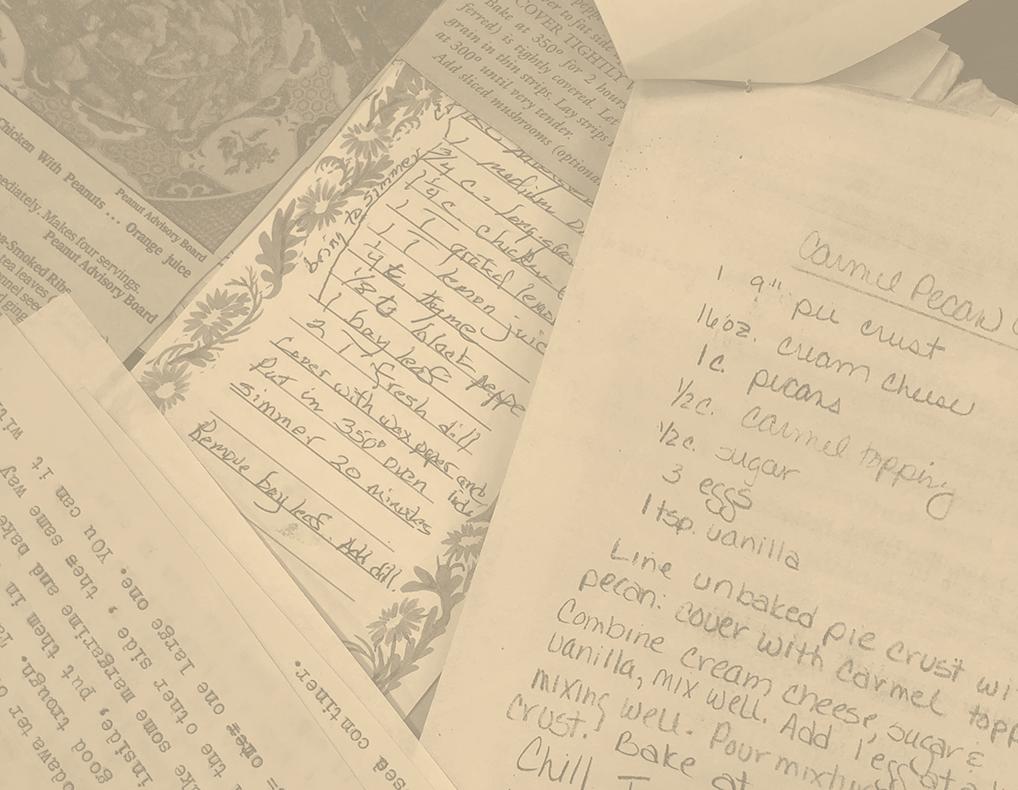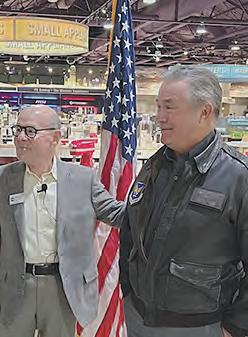
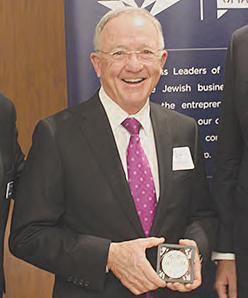





MARY SUE GROSSMAN
Beth Israel
Synagogue is delighted to celebrate an exciting new chapter as Rabbi Mordechai Geiger has been named Senior Rabbi. Rabbi Geiger joined the Beth Israel staff in the fall of 2023 as assistant rabbi, moving from Phoenix where he was with the Phoenix Community Kollel. He, his wife, Ayelet, and their children quickly made an impact on the congregation and the community.
Originally from Los Angeles, Rabbi Geiger has a Bachelor of Science degree in Behavioral Science from Bellevue University and attended Mir Yeshiva in Jerusalem, Sh’or Yoshuv in New York, and Ner Israel Rabbinical College in Maryland. In addition to his rabbinic duties, Rabbi Geiger is working toward a master’s degree in clinical counseling. He is currently doing internship work at Jewish Family Service.
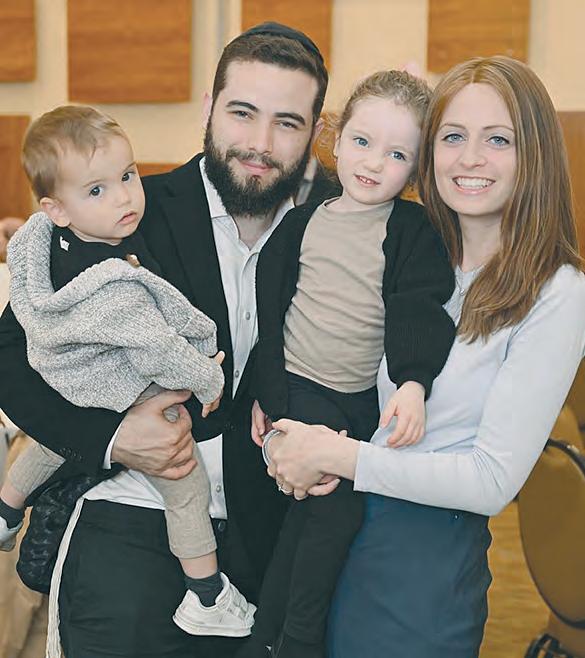
the couple strongly believed in building relationships and that creating a sense of community and fostering a supportive environment was of high importance.
SETH SCHUCHMAN
In Nebraska, football isn’t just a game. It’s part of who we are. Every fall, the echoes of “Go Big Red” stretch from Omaha to Scottsbluff. Families gather, friends reunite, and communities pause for a few hours of unity and excitement.
As assistant rabbi, Rabbi Geiger has strengthened learning opportunities, expanded programming, and deepened personal relationships within the community.
In a 2023 article announcing Rabbi Geiger and Ayelet’s arrival, Rabbi Geiger shared that
Yosef Seigel, Beth Israel president, shared that it was a natural decision to offer the senior position to Rabbi Geiger. ”From the first day, Rabbi Geiger fit into our congregation. He was quick to engage with members, initiate conversations, learn about the community, and work to develop ways to be involved. We are confident Beth Israel is in a good See Rabbi Geiger page 2
SARA KOHEN FJA Director of Advancement
When the leadership team at Friedel Jewish Academy began working with their architect to design the school’s new entryway, they knew they wanted something special to welcome students and visitors. “We immediately thought of Shiri Phillips,” said Head of School Beth Cohen. “Her paintings are so vibrant. They really
reflect the energy of our school.”
Phillips, who is a painter based in Omaha (as well as the mother of Friedel students and a member of Friedel’s Board of Directors), immediately agreed.
“Friedel has been such an important part of my family’s life,” Phillips said. “I loved the idea of creating something that would welcome the students each day—a joyful, colorful piece that celebrates this amazing community.”
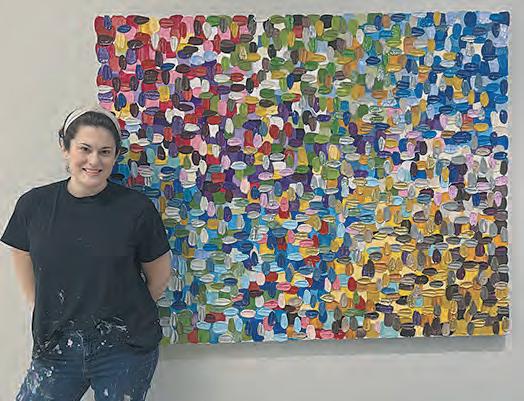
Friedel’s new entryway was completed before the beginning of school in August as part of a larger renova-
tion project that also included security improvements, a commercial kitchen, and updates to the common areas on the main level, where Friedel’s elementary school is. (The middle school, which opened in 2023, is located on the lower level.)
See Friedel painting page 2
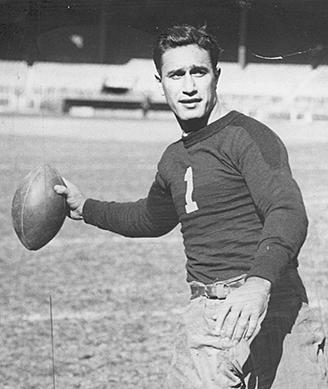
When I played high school football, I became curious about whether there were other Jewish football players out there. We have made our mark in baseball, boxing, and plenty of other sports, but Jewish players on the football field have always intrigued me. There is something about the toughness and physical side of the game mixed with a heritage that values learning, faith, and family that I have always found meaningful.
My grandfather, Max Greenfield, played for Tech High in the early 1930s. He earned regional honors and even a scholarship to the University of Iowa, but he turned it down to go to work, like so many immigrants did back then. His story has always reminded me that perseverance and sacrifice are part of both our faith and our family’s story. And as I learned more, I found that while Jewish names may not fill the record books, their stories fill the heart of the game.
One of the earliest stars was Benny Friedman, a quarterback at the University of Michigan in the 1920s who helped invent the modern passing game. Sportswriters said his throws looked like “bullets with wings.” After college, he went on to play in the NFL for the Cleveland Bulldogs in 1927, the Detroit Wolverines in 1928, the New York Giants from 1929 to 1931, and the Brooklyn Dodgers from 1932 to See Jewish Stories in Sports page 3
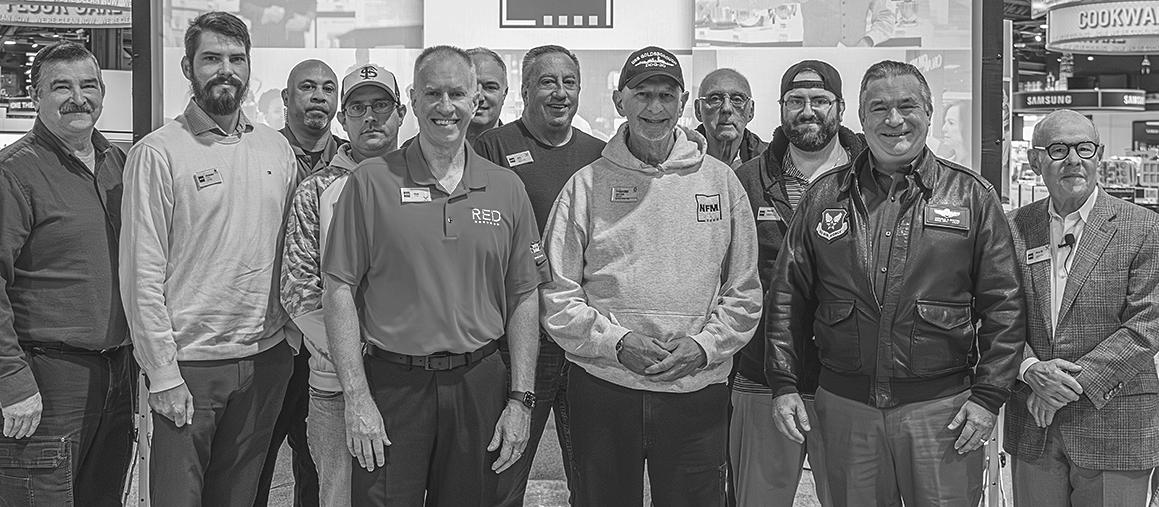
ANDY SHEFSKY
NFM
PR Manager
NFM has been awarded the Above and Beyond Award by the Employer Support of the Guard and Reserve (ESGR), a Department of Defense program that recognizes employers who go above standard requirements in support of employees who serve in the National Guard and Reserve. The award was formally presented during a special ceremony at NFM’s Omaha store on Veterans Day, Nov. 11.
U.S. Congressman Don Bacon, who served nearly 30 years in the United States Air Force and retired as a Brigadier General, participated in the ceremony and presented remarks honoring military service members and their families. Congressman Bacon has long been a supporter of veteran initiatives and employer partnerships that strengthen military families.

“NFM is deeply honored to receive the Above and Beyond Award,” said Tony Boldt, CEO and President. “Service to others is part of our heritage, and we are proud to support our teammates who serve our country both in and out of uniform.” The recognition highlights NFM’s longstanding commit-
ment to military service members. This legacy of service traces back to the company’s roots. Louie Blumkin, son of NFM founder Rose Blumkin, served in the U.S. Army during World War II under General George Patton. He helped liberate Nazi concentration camps and earned a Purple Heart for his bravery. Louie’s legacy of patriotism lives on through NFM’s commitment to veterans and their families.
As part of its Veterans Day observance, NFM hosted several employee and community events:
• Veterans Appreciation Breakfast for all NFM staff
• Flag Raising Ceremony
• Presentation of NFM Challenge Coins to every NFM employee who has served, including Ron Blumkin, NFM Vice Chairman and U.S. Air Force veteran
• American Flag giveaway to customers
“NFM’s respect for military service is part of who we are,” said Boldt. “We are grateful for the bravery, commitment, and sacrifice of those who serve.”
‘Write With Us,’ our small and intimate writing workshop (no need to be nervous) continues in the winter and early spring. Upcoming workshops are scheduled for the following Thursdays: Jan. 29, Feb. 26, March 26 and April 30 from 5-7 p.m. in the Noshery at the Staenberg Omaha JCC. Register by contacting Jessi at jtaylor@jewishomaha.org or Annette at avandekamp@jewishomaha.org. There is no cost to attend, although donations are always welcome.
If you have wanted to write your family’s story, that great American novel, or you have always wanted to try your hand at poetry, join us! Maybe you are already an accomplished writer, but you would benefit from being in a room with other writers. Perhaps you have convinced yourself you can’t write at all, but would love to try. Everyone, from absolute beginner to professional, is welcome to attend. We will provide the kosher snacks and the writing prompts.
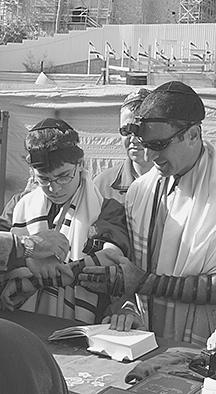

Continued from page 1 position to grow stronger and grow under Rabbi Geiger’s leadership.
The community is invited to join the Beth Israel congregation on Sunday, Nov. 23, 11a.m.– 1 p.m., for an investiture event, celebrating Rabbi Geiger’s new position. This open house event will include speakers, refreshments, and the opportunity to chat with Rabbi Geiger and Ayelet and other attendees.
An honored speaker will be Rabbi Daniel Cooper, a longtime mentor of Rabbi Geiger. Current rabbi of Khal Mevakshei Torah of Far Rockaway, New York. He is also a Rebbe at DRS Yeshiva High School and a lecturer in the SHAAR program, Shor Yoshuv’s Balei Teshuva program. Additionally, he is the assistant director at NCSY Camp Sports.
“Ayelet and I feel incredibly blessed to be part of this wonderful community,” shared Rabbi Geiger. “Beth Israel is a place of warmth, growth, and Torah. We look forward to building upon the foundation of those before us, and continuing to learn and celebrate together, welcoming every Jew in Omaha with open arms.” He added that Beth Israel continues to grow as a vibrant center of Jewish life, strengthening engagement with young families, expanding learning opportunities, and fostering a warm and welcoming environment for all who walk through its doors.
Please contact the synagogue office at 402.556.6288 or bethisrael@orthodoxomaha.org with any questions. To be added to the synagogue email list to receive the most current information, please send your request to executiveasst @orthodoxomaha.org
Continued from page 1
This fall, Phillips installed the painting. The piece is a large, textured abstract filled with vibrant color and movement. Inspired by the colors of Friedel’s logo, Phillips used bold blues and greens mixed with accents of orange, pink, purple, and yellow to mirror the school’s bright, welcoming spirit. She layered thick strokes of paint in rhythmic patterns and added glitter throughout the surface to catch the light and the children’s attention. “I wanted it to sparkle and feel alive,” she said. “The kids are fascinated by the texture—they love to get close and see how the paint stands off the canvas.”
“I wanted the piece to feel positive and full of life,” Phillips added. “It’s about joy, curiosity, and connection—all the things that make Friedel such a special place.”
More information about Phillips’s artwork can be found at shiriphillips.com. To learn more about Friedel, visit friedeljewishacademy.com
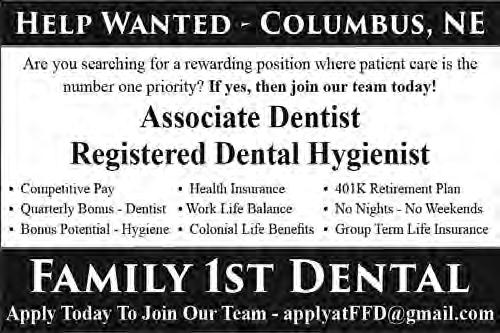








Continued from page 1
1934. Friedman, the son of immigrants, helped change football forever, leading the league in both passing and rushing touchdowns, something no one has matched since.
A few years later came Sid Luckman, who led the Chicago Bears to four NFL championships in the 1940s. Luckman was a Columbia graduate, smart, disciplined, and loyal. He became the quarterback in George Halas’s new T formation offense, which reshaped the way football was played. Luckman is still one of the greatest quarterbacks in Bears history and one of the most influential Jewish players ever to take the field.
Fast forward several decades and you will find Julian Edelman, the New England Patriots wide receiver who seemed to shine brightest when the stage was biggest. Edelman was the MVP of Super Bowl LIII, the first Jewish player to ever earn that honor. He has talked often about discovering and embracing his Jewish identity, something he wears proudly along with his three Super Bowl rings. His story shows how excellence and heritage can walk hand in hand.
Then there is Mitchell Schwartz, a steady and dependable offensive tackle who spent nearly a decade in the NFL, first with the Browns and later with the Chiefs, where he won a Super Bowl in 2020. Schwartz played 7,894 straight snaps before his first injury, a streak that says everything about his discipline and determination. He is proof that greatness often comes from consistency, not flash. Nebraska fans understand that kind of work ethic.
Mark Herzlich brought a different kind of courage to the game. A standout linebacker at Boston College, he was diagnosed with a rare bone cancer after an All-American season. Against all odds, he beat it, came back to the field, and later won a Super Bowl with the New York Giants. His story of strength, faith, and resilience fits right in with Nebraska’s football spirit.
And there are the quiet grinders like Kyle Kosier, who played at Arizona State and then spent a decade in the NFL with Dallas and Detroit. He was not flashy, but he was solid and respected. When he learned one of his teammates was also
Jewish, he said it felt good to share that connection. Sometimes faith shows up in small moments like that, honest and human, even in a tough locker room.
Here in Nebraska, there have been Jewish players who wore the scarlet and cream, and perhaps others whose stories we have yet to uncover.
Jordan Ober, a Husker long snapper from 2015 to 2018, took the field week after week, season after season, with quiet precision. Before each snap, he whispered the Shema, “Hear, O Israel,” a small prayer that helped center him and reminded him who he was. In a sport built on dependability and discipline, that moment of faith spoke volumes about the connection between identity and purpose that runs deep in Nebraska football.
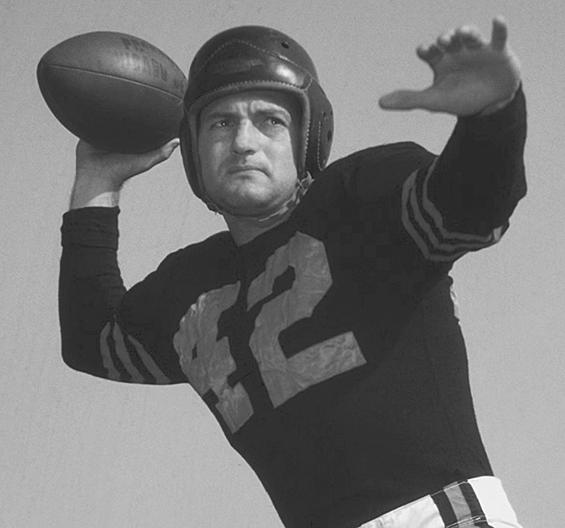
He was part of the Nebraska
team that went to the 1941 Rose Bowl, where the Huskers faced Stanford. Nebraska lost that day, but Muskin earned something far greater in life. He served in the Navy during World War II and was awarded the Silver Star for bravery. Years later, he was inducted into the Central High School Hall of Fame. Muskin’s life, from the gridiron to military service, tells the story of both courage and commitment, the kind of story that fits right into Nebraska’s proud tradition. And long before either of them, there was Elmer Greenberg, an Omaha native and the first Jewish player to suit up for the University of Nebraska. He played from 1927 to 1930, wearing number 46 and anchoring the offensive line when the Huskers were new members of the Big Six Conference. His teams shut out opponents, went undefeated in conference play, and brought pride to the state. In 1930 he earned Walter Camp All America Honorable Mention and First Team All Big Six honors.
From Friedman’s precision to Luckman’s leadership, from Edelman’s spark to Schwartz’s steadiness, from Herzlich’s courage to Kosier’s teamwork, from Greenberg’s pioneering years to Muskin’s service and Ober’s quiet faith, Jewish players have brought something special to football’s story and to ours. Here in Nebraska, we understand the value of hard work, loyalty, and heart. These players, past and present, reflect those same values. As we cheer on our Huskers, it is good to remember that the game we love has always been bigger than any one team or town. It is a tapestry woven with stories of faith, resilience, and community.
And like the best football stories, this one reminds us that no matter where we start, what we believe, or what number we wear, there is always room for spirit, pride, and a shared love of the game.
Thanks to the Nebraska Jewish Historical Society for their archival support and for keeping stories like these alive. If you have a local sports story or a piece of memorabilia in your family, please share it with the Society so it can be preserved and celebrated. Together, we honor our history and the community pride that continues to shine, both on and off the field.
Sources: Information for this article was drawn from: Pro Football Hall of Fame; University of Michigan Athletics archives; Columbia University Athletics; Nebraska Cornhuskers Official Athletic Site (huskers.com); Nebraska Football Hall of Fame; NFL.com; Pro Football Reference; Religion News Service; Jewish Virtual Library; Times of Israel; The Great Rabbino; Encyclopedia Britannica; Kansas City Chiefs official site; New York Giants official site; Omaha World-Herald archives; and the Nebraska Jewish Historical Society.
The award-winning B’NAI B’RITH BREADBREAKERS speaker program currently meets Wednesdays via Zoom from noon to 1 p.m. Please watch our email for specific information concerning its thought-provoking, informative list of speakers. To be placed on the email list, contact Breadbreakers chair at gary.javitch@gmail.com


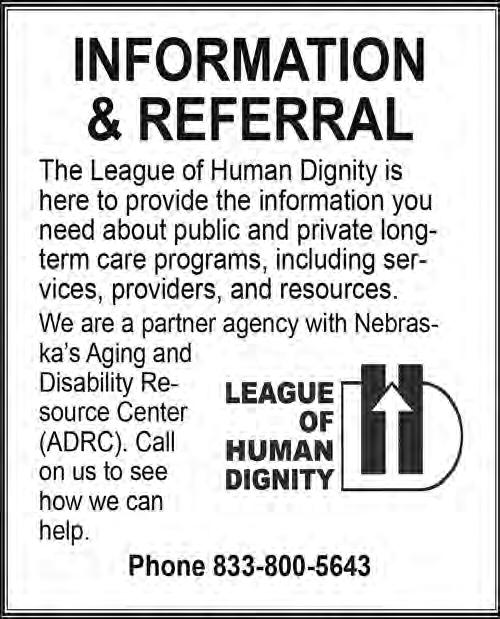

JAY KATELMAN
JFO Director of Community Development
On Oct. 17, 2025, Jewish Business Leaders (JBL) had the privilege of hosting Mike McCarthy, founder of McCarthy Group, LLC — now known as M-One Capital — for an engaging fireside chat on leadership, long-term investment, and community building.
M-One Capital is an investment holding company that partners with managers to acquire and grow businesses. Today, its portfolio includes more than forty companies nationwide, with a strong Omaha presence — including Election Systems & Software, America’s largest election services business; Scooter’s Coffee, a rapidly expanding franchise with more than 800 stores; Bridges Trust, a multigenerational wealth management firm serving families; and the iconic Omaha Steaks, one of the city’s most respected family enterprises.
The discussion, moderated by Alex Epstein, EVP of OMNE Partners and Founder of Jewish Business Leaders, offered attendees an inside look at how McCarthy built one of the Midwest’s most respected investment organizations. McCarthy shared stories from his early days growing up on an Iowa farm to founding a construction company, and later transitioning into private equity and strategic investments.
Unlike many firms that seek quick exits, McCarthy emphasized the importance of partnership and stewardship: “We look for great companies that are already respected, and our job is to make them even better. We don’t just buy to sell — we buy to grow.”
He also highlighted the value of long-term relationships and Omaha’s potential as a center for generational wealth, innovation, and philanthropy. One particularly memorable moment came when McCarthy recalled how Warren Buffett himself referred the Scooter’s Coffee acquisition to him — a testament to McCarthy’s integrity and standing in the investment community.
rise of artificial intelligence represents one of the most significant waves of disruption in modern history. “The wave is here,” he said. “We just don’t yet know if it’s ten feet tall or a tsunami — but it’s coming. If you have a desk job, that desk job may very well be replaced by AI.”
He also spoke insightfully about the future of energy and data centers, painting a visionary picture of where technology could lead. McCarthy suggested that in the next 20 years, data centers might not even be Earth-bound — envisioning future facilities cooled in outer space, powered by solar energy, and located closer to the sun to improve efficiency.
Another key takeaway came from McCarthy’s reflections on navigating antitrust laws during acquisitions involving Election Systems & Software. He explained how those experiences underscored the power and reach of government regulation — and how understanding that dynamic became a core part of his long-term investment strategy.
Never losing his sense of humor, McCarthy also joked about the role of interest rates in his four-decade investment career: “It’s been a pretty good run — interest rates go down, values go up, and somehow that makes me look like a genius.” The line drew laughter from the audience and underscored his trademark humility.
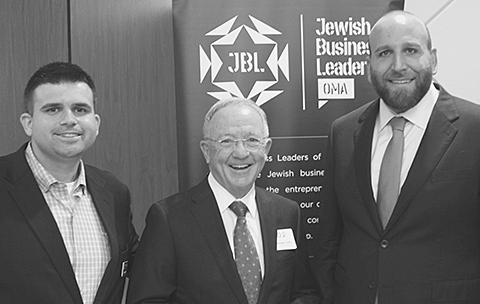
“We were incredibly fortunate to have Mike McCarthy join us,” said Alex Epstein, Founder of Jewish Business Leaders and Executive Vice President at OMNE Partners. “He’s not only a pinnacle changemaker in Omaha’s business community, but also someone who’s deeply invested in the city’s growth and people. At Jewish Business Leaders, our goal has always been to bring together a community that learns from the very best — and it doesn’t get better than Mike. Hearing his insights on scaling, acquiring, and exiting companies, and his candor about what worked and what didn’t, was an invaluable experience for everyone in the room.”
McCarthy spoke with genuine admiration for Omaha Steaks, calling it a privilege to be part of a company so deeply rooted in family tradition and entrepreneurial excellence. He expressed immense respect for the brand’s legacy and for the family behind it.
McCarthy emphasized that his approach has always been to support founders, not replace them. Unlike many private equity investors, McCarthy explained, M-One Capital seeks to amplify what makes founders great rather than “get in the way.”
He also shared a humorous story about his investment in Bridges Trust, reflecting on its remarkable evolution. “When we acquired Bridges, the marketing budget was about $4,000 a year — and that probably just covered the founder’s lunches at Happy Hollow,” he joked, drawing laughter from the crowd. “So we decided to buy the most expensive billboard possible — by building a new headquarters on Dodge Street.” Since that acquisition, Bridges Trust has grown from managing $1 billion in assets to over $12 billion, a testament to M-One’s vision and long-term approach.
Throughout the conversation, McCarthy offered candid reflections on today’s rapidly changing world. He noted that the
Epstein noted that McCarthy’s blend of humility, discipline, and long-term vision resonated deeply with attendees. Beyond business lessons, McCarthy spoke passionately about philanthropy, purpose, and building enduring value.
“Our mission at Jewish Business Leaders is to highlight individuals who have made a profound impact on the business landscape, and to create opportunities for Omaha’s business and Jewish communities to connect, share, and learn from one another,” Epstein added. “This event was a perfect example of that vision in action — we’re truly grateful to Mike for sharing his time and perspective with us. We were able to hear from one of the best in Mr. Mike McCarthy.”
The event concluded with a lively Q&A and networking session, leaving the audience inspired by McCarthy’s approach to leadership, investing, and community engagement.
Jewish Business Leaders extends its gratitude to the event sponsors for making the evening possible.
Platinum Sponsors: Bridges Trust, OMNE Partners, and CFO Systems.
Event Sponsors: Lutz, American National Bank, Koley Jessen, Metonic Real Estate Solutions, UNICO Group, Spruce Capital Group, and Alex Epstein
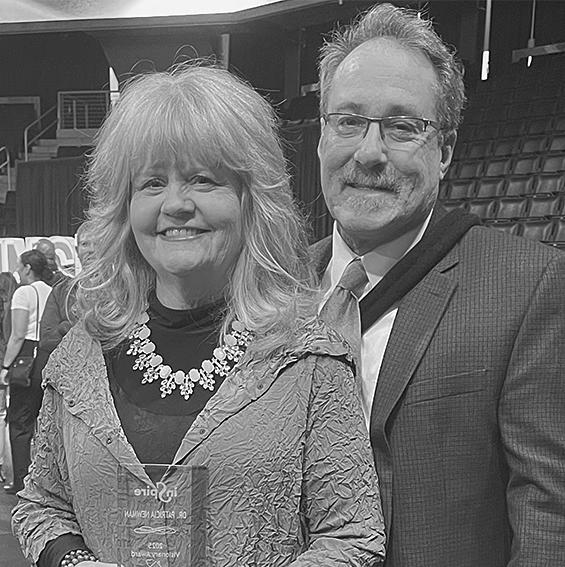
organization that has provided thousands of programs to over 600,000 students since its inception.
The mission of RESPECT is to Build Healthy Relationships Using Theater and Community Collaboration. With a catalogue of over a dozen plays for students aged preschool through adults and numerous workshops, programs are datadriven and focus on helping students develop skills they need to be safe, healthy and happy in relationships with others. Programs are developed using a wide variety of educational plays and theater techniques and address topics such as bullying, child abuse, dating violence, safety online and in social media, depression/suicide, negative/positive peer pressure, kindness to animals, identity-based bullying and many more topics related to mental health.
The Inspire Committee noted:
“Dr. Newman has dedicated her career to helping children have safer and healthier lives.”
Dr. Newman has received numerous honors, including the YWCA Tribute to Women Award, NSPA’s Psychologist of the Year Award and the 2022 School Mental Health Champion Award. RESPECT recently celebrated their 25th Jubilee Anniversary.
The Inspire Awards celebrate exceptional women across ten distinct categories. These awards highlight individuals whose professional achievements and community contributions have made Omaha a better place to live and thrive.
Justice Lindsey Miller-Lerman recalled a few pearls of wisdom she leaned on while ascending in her history-making role as the first woman appointed to the Nebraska Supreme Court.
One guiding principle, passed along by her film editor son Jeremy came in handy while penning, participating or appearing in 5,832 career legal opinions: Don’t bore, don’t confuse.
Miller-Lerman bored few last year with an opinion in which she drew upon Patty and Selma of “The Simpsons” cartoon fame to make a serious point about separation of powers among government branches.
to apply the law.”
Miller Lerman’s parting words at a courtroom retirement ceremony: “I took an oath,
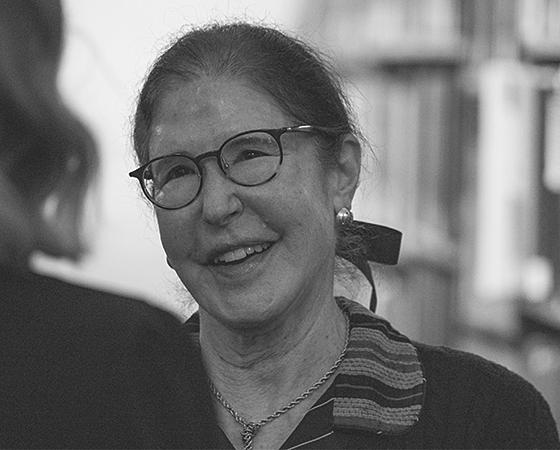
And there was no confusing her messages in dissents on rulings, including one that left the state immune from a lawsuit brought by three siblings for years of physical and sexual abuse while in foster care.
Now, at age 78 — after serving six years as an inaugural judge on the Nebraska Court of Appeals and 27 years on the Nebraska Supreme Court — Miller-Lerman hung up her robe.
The mother and grandmother of two said she approached her work with judicial “restraint,” careful to avoid politics and to not be too “frisky.” She enjoyed staying in touch
Zach Wendling/Nebraska Examiner
and I think I kept my promise.”
Colleagues talked of a competitive spirit, noting that as a teen she represented the U.S. in the 1961 Maccabiah games, winning three medals, two gold and a silver. She beat a teammate for one of the golds, who, according to Swimming World, went on to win a silver medal at the 1964 Olympics in that same event, and later set a world record.
Miller-Lerman, after graduating from a California high school in 1963, went to Boston area Wellesley College and was on her legal track.
She said she felt fortunate to have role models such as Ruth Bader Ginsburg, who was her professor at Columbia Law School and, later, the second woman on the U.S. Supreme Court. Miller-Lerman clerked for Constance Baker Motley, a civil rights legend and the first Black woman to be named a federal judge.
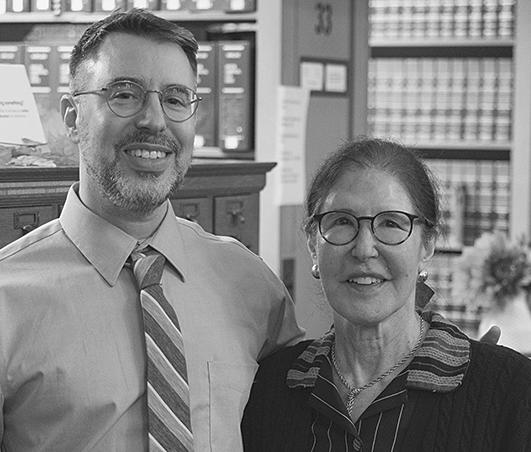
Court
with pop culture to connect with the masses and, when appropriate, drop a colorful reference into writings and conversations. She believes she contributed to the “useful” role of a judge and takes pride in furthering the discussion of gender equality.
“When you look at the body of work, forget all the administrative stuff that eats up an enormous amount of time, I think you could say, intellectually, I was disciplined and didn’t have poor humor,” Miller-Lerman said.
Her retirement follows what colleagues describe as a trailblazing run launched when a young West Coast swimming champion opted for a legal career and rose to partner status at a major Omaha law firm while working part-time raising two children. Then-Gov. Ben Nelson, the last Democrat to lead the state, named her in 1991 to the newly established appeals court, where she was the first woman to serve on a Nebraska court higher than the district court. In 1998, he appointed her to the state’s highest court.
Nelson lauded the Miller-Lerman appointments as among his best, saying she was not “anxious to make law” but rather “has been steadfast with her resolve to find justice and
MARTY SHUKERT
Monsky Lodge Bible Quiz Chair
The time is approaching for one of our community’s most anticipated annual events. Yes, it’s time for the Edward Zorinsky B’nai B’rith Bible Quiz. It’s an opportunity for students to test their knowledge of our texts and compete with each other for “fame and fortune.”
This year’s contest is called “Jeopardy! –The Kings Edition.” The quiz will adapt the format of television’s Jeopardy! to create an exciting event that requires both knowledge and strategy. Participants have been hard at work studying this year’s subject – the First Book of Kings. The book includes such stories as Solomon’s kingdom, the split between the northern and southern kingdoms, the exploits of Elijah, and other events in our history. It is a story of faith, villainy war, competing theologies, and political intrigue, complicated characters, and famous buildings.
The Jeopardy! format will give parents and other spectators the chance to play along and cheer for their favorite contestants. And like the iconic TV show, participants compete for high stakes: $1,000 for first place, $750 for second, $250 for third. In addition, each contestant who answers three questions correctly will walk away with $50 in cash, with the winner earning $100. Last year’s event drew a full house of both contestants and audience members and we expect this year’s contest to be just as exciting. This year’s contestants are already hard at work studying – your support means a lot to them.
The Edward Zorinsky Bible Quiz is open to students from 8th to 12th grades and will take place at 1 p.m. on Sunday, Dec. 7 at the Jewish Community Center. Refreshments will be served. To enroll, please contact your synagogue, the BBYO office at the JCC, or Chabad. Be there and join the excitement!
Announcements may be e-mailed to the Press at jpress@jewishomaha.org; or mailed to 333 So. 132 St., Omaha, NE 68154. Readers can also submit announcements -- births, b’nai mitzvahs, engagements, marriages, commitment ceremonies or obituaries -- online at www.omahajewish press.com/site/forms/. Deadlines are normally nine days prior to publication, on Wednesdays, 9 a.m. Please check the Jewish Press, for notices of early deadlines.
Former U.S. Rep. John J. Cavanaugh, D-Neb., who also spoke at the retirement event, recalled meeting Miller-Lerman in 1980 when he joined Omaha-based Kutak Rock law firm after his time on Capitol Hill. He saw her as a rising star litigator and said it was unheard of at the time for a part-time practicing lawyer raising children to become a partner in a major law firm.
“A small Sturgis bike riding Jewish girl from Los Angeles with an Ivy League education and a heart of gold and a head of steel principles … a permanent fixture in our history,” Cavanaugh said of Miller-Lerman.
Perhaps her best-known opinion, said Miller-Lerman, is the 2007 State v. Winslow ruling, which allowed DNA testing for two of the “Beatrice Six” convicted in 1989 of a 1985 murder. The results showed neither had committed the crime. All six eventually were exonerated.
She plans to remain in Omaha, where her then-husband’s job first took the young family in 1975. Retirement allows more time with her grown children, Jeremy and Hannah, who live in other states. Still active and a gym-goer, Miller-Lerman is considering another level of service, including availability as a retired judge.
“I’ll be useful,” she said.
This article was first published by the Nebraska Examiner and was reprinted with permission. This version was edited for length; please find the full article at nebraskaexaminer.com or at omahajew ishpress.com

Please let the Jewish Press know in advance when you are leaving and when you are returning. Sometimes several papers are sent to your “old” address before we are notified by the Post Office. Every time they return a paper to us, you miss the Jewish Press and we are charged! Please call us at 402.334.6448 or email us at jpress@jewishomaha.org.
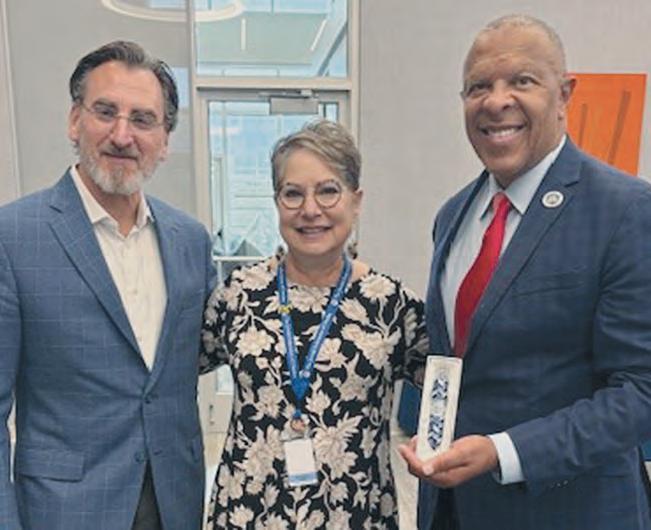
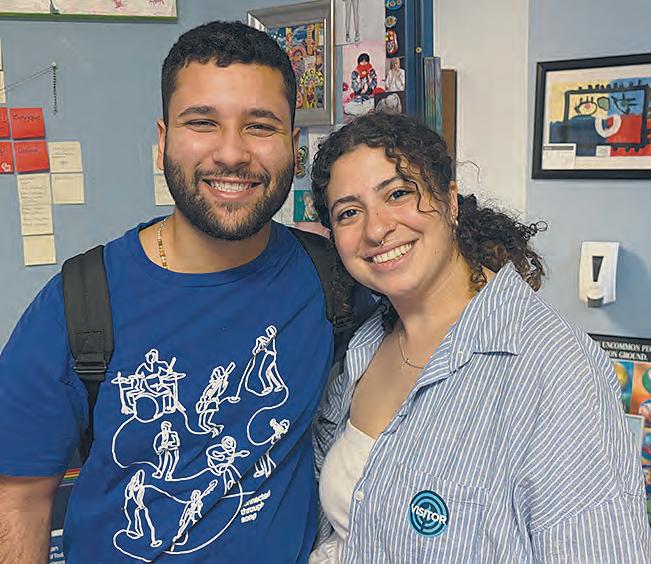
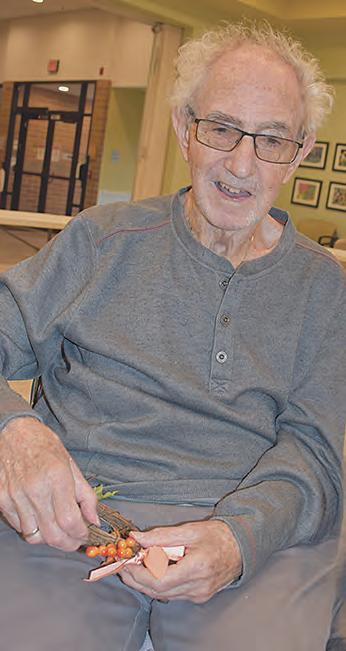
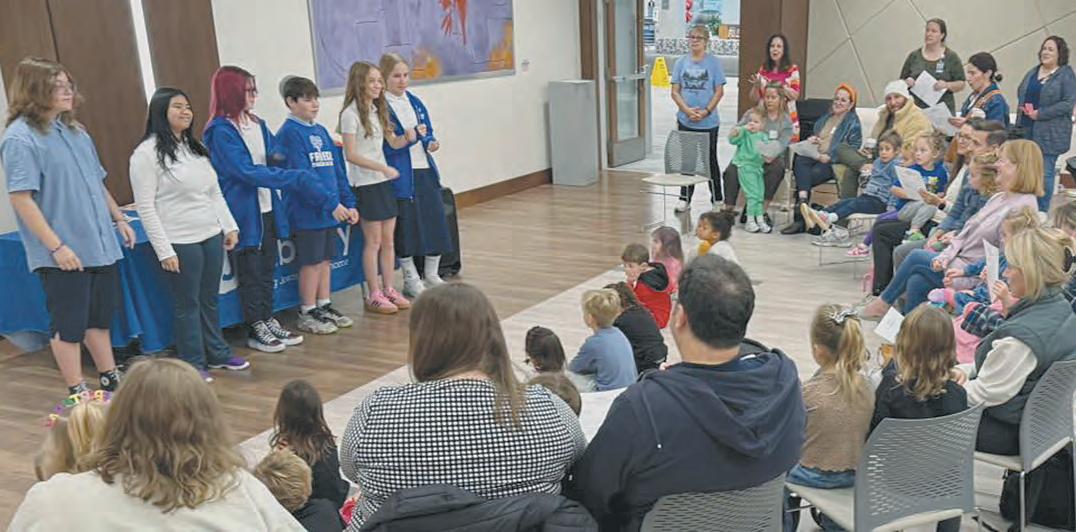
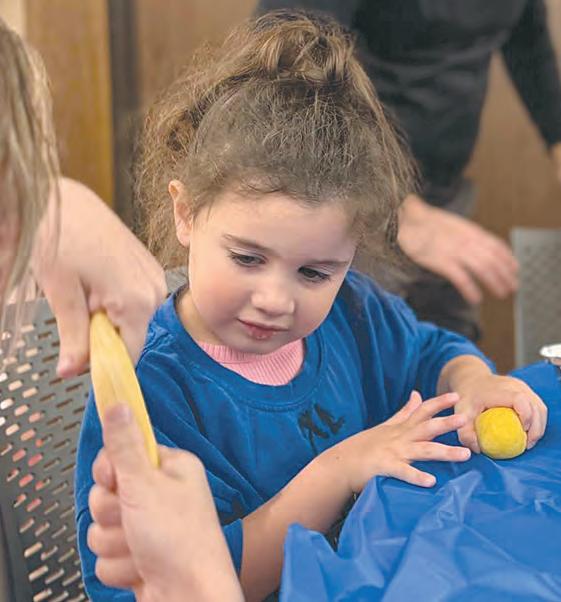

PHOTOS FROM RECENT JEWISH COMMUNITY EVENTS
SUBMIT A PHOTO: Have a photo of a recent Jewish Community event you would like to submit? Email the image and a suggested caption to: avandekamp@jewishomaha.org
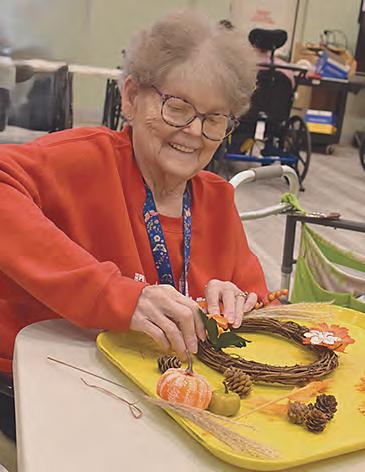
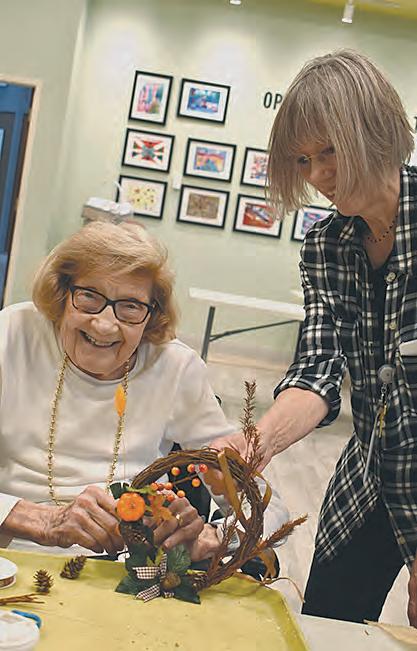


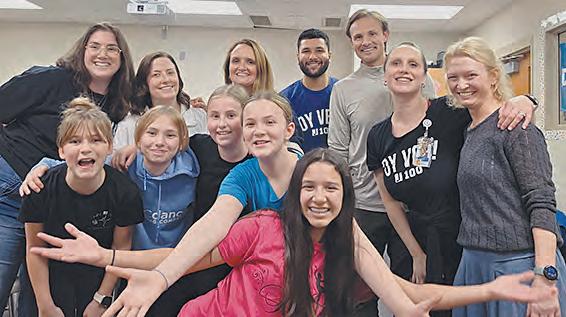
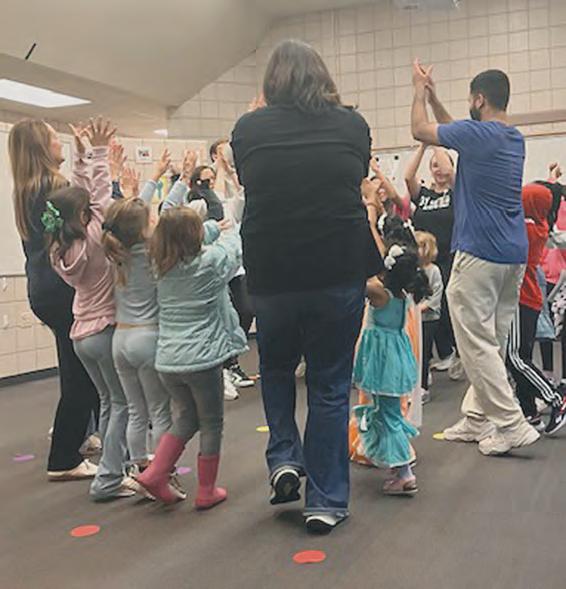
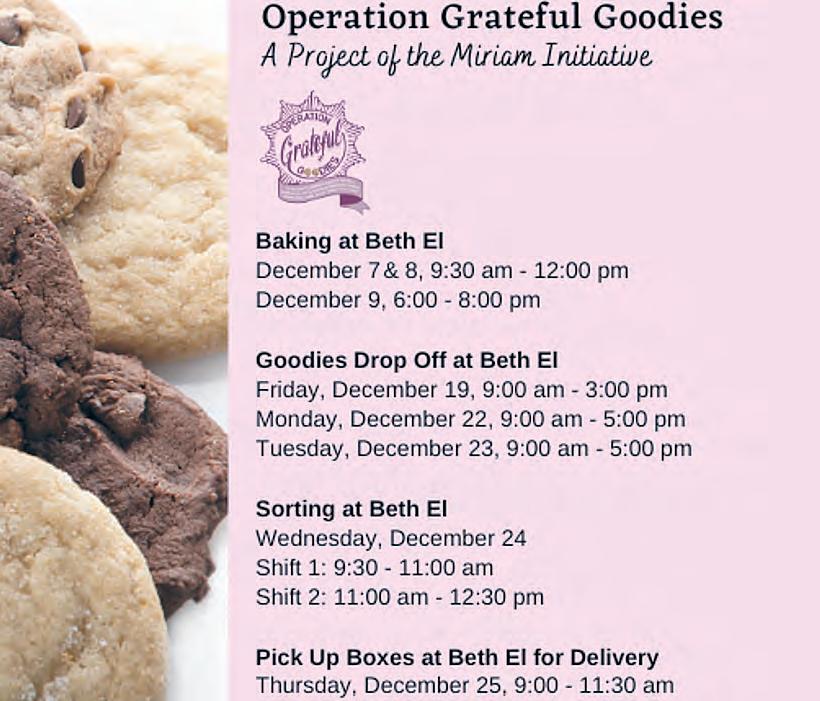
LINDA SALTZMAN
It’s a bummer to have to work on Christmas Day.
Those that celebrate the holiday would rather be at home with their families. But instead, they are saving lives, protecting our community and providing other critical services. For the past seven years, Omaha Jews have shown their gratitude for those hardworking lifesavers on Dec. 25. (Or on December 24th one year due to bad weather.) This year, we will do it again.
2025 will mark the 8th annual Operation Grateful Goodies,
a program of Beth El’s Miriam Initiative, where we deliver thank-you gift boxes to doctors, nurses, firefighters, policemen, weather forecasters, hospice care specialists, emergency veterinarians, air traffic controllers and everyone else who works to help/heal/protect us on Christmas Day.
Anyone and everyone can participate in Operation Grateful Goodies.
Do you like to bake? We need volunteers to make homemade goodies. Cookies, brownies, muffins and candies are among the items we welcome. They do not have to be kosher. Do you like to organize? We need volunteers to sort and package gift boxes.
Do you like to make someone’s day? We need volunteers to deliver gift boxes.
Do you like to write? We need volunteers to write thank-you notes to attach to each gift box.
Do you like to shop? We need single-serve, individually wrapped treats for locations that don’t accept homemade goodies.
Do you want to donate funds for the project? Donations are accepted on Beth El Synagogue’s website.
Operation Grateful Goodies is a program sponsored by Beth El Synagogue in partnership with Beth Israel, Temple Israel, Chabad of Nebraska and the Jewish Federation of Omaha. It is truly a communitywide endeavor.
Please visit https://www.bethel-omaha.org/form/ grateful-goodies-2025.html or the Beth El website to sign up for Operation Grateful Goodies and thank those who work on our behalf on Dec. 25
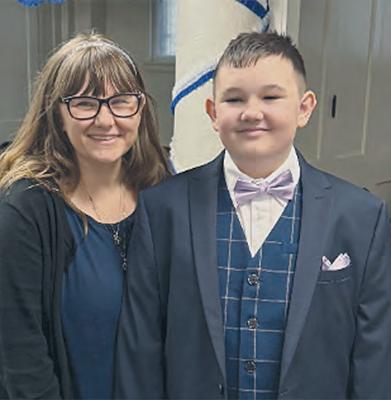
CONNOR P. MULLIN
Three B’nai Mitzvahs in a single year is rare but not unheard of in the Lincoln Jewish community. Three B’nai Mitzvahs in a single month, on the other hand, is nearly unique, yet that’s just what happened in October. The community was proud to celebrate two Bat Mitzvahs and one Bar Mitzvah, as Ruth Muriello, Avigail Muriello, and Liam Owens celebrated some of their most important life milestones.
“Liam said that he loved his Bar Mitzvah, that it was full of good food, good vibes, and great people,” said Liam’s mom, Alyssa Owens. “We both can’t believe how lucky we are to be a part of this community. It’s really special to us.”
Ruth said that “she enjoyed learning, while training to lead the congregations and bring the community together to celebrate.” Avigail added: “The community was so supportive and
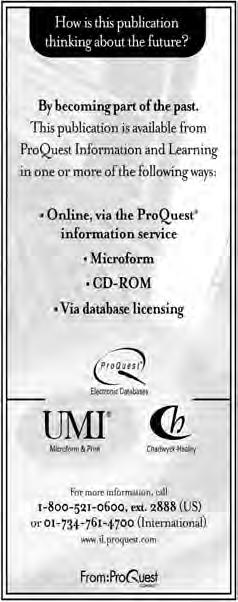
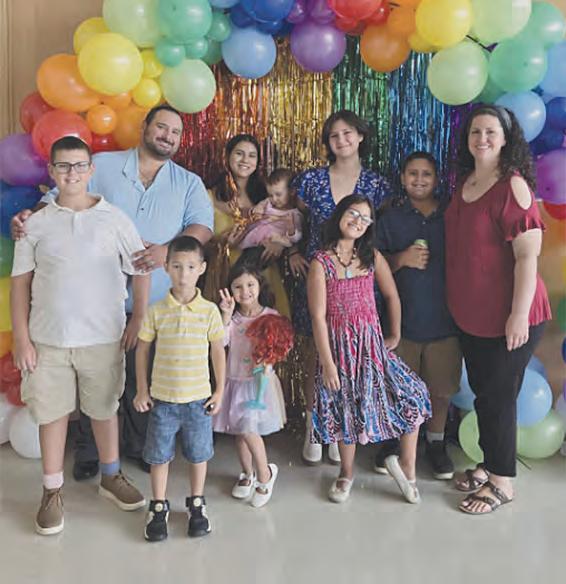
like a family. I learned so much about Judaism along the way.” Their parents, Frank and Amy, are incredibly grateful for the love and support from the whole Lincoln Jewish Community.



PAM MONSKY
JCRC
Assistant Director
Shine A Light, Share A Light!
This Hanukkah, let’s spread the light even further!
Each year during Hanukkah, the Jewish Community Relations Council (JCRC) joins the Jewish Federations of North America (JFNA) in the Shine A Light on Antisemitism campaign—an initiative dedicated to demystifying Judaism and increasing awareness about recognizing and confronting antisemitism.
This Hanukkah, JCRC is expanding the effort with Shine A Light, Share A Light! Community volunteers, along with members of the JCRC Advisory Board and Interfaith Relations Committee, are partnering to promote understanding and connection by sharing the joy of Hanukkah with the broader community.
Leading this initiative are Toba Cohen Dunning, Linda Fischer, Danielle Gordman, and Torri Hausler, who are encouraging and stewarding members of the Jewish community to set aside one night to welcome non-Jewish friends, neighbors, and colleagues into their homes to experience Hanukkah traditions.
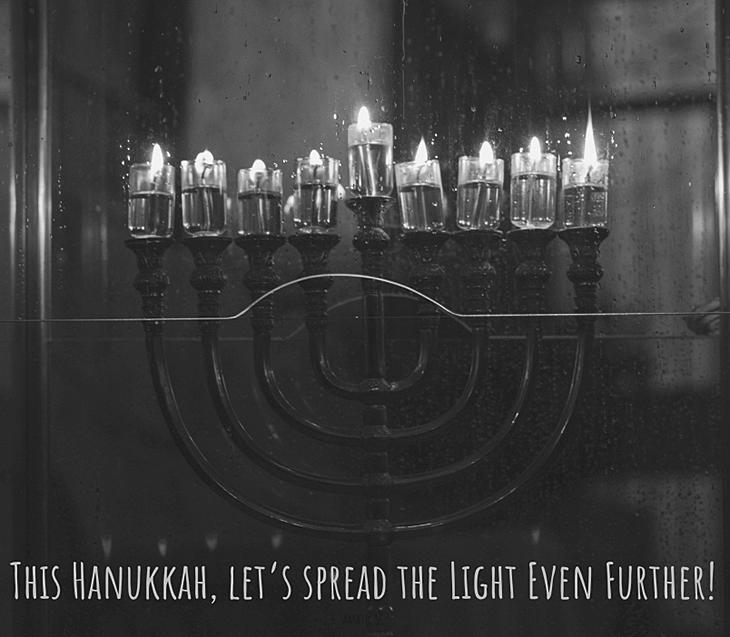
To support participating homes and families, JCRC is providing a special Hanukkah Hospitality Kit with all the materials needed to share the light.
Light the menorah together, enjoy delicious latkes or sufganiyot, spin the dreidel, and share the stories that highlight the meaning and spirit of the Festival of Lights.
AMY BERNSTEIN SHIVVERS
JFO Foundation Executive Director
Now is the perfect time to establish or grow your endowment. The Foundation’s $150,000 Endowment Incentive Pool offers a 25% match for new or increased endowments — but only while funds last.
Last year, our 4Q Endowment Incentive raised $1.3 million in just three months, creating 23 new funds supporting education, social services, Jewish life, and more. These gifts are already making a difference — strengthening our community for generations to come.
For more information or to sign up, please contact Pam Monsky, JCRC Assistant Director, at 402.334.6572 or pmon sky@jewishomaha.org by Dec. 12
A legacy gift through an endowment is simple, meaningful, and lasting. As one donor said, “You don’t need to be wealthy to create a legacy gift — the process is easy, and the impact is forever.”

Make your legacy count.
Contact the Jewish Federation of Omaha Foundation, 402.334.6466, today to learn more.
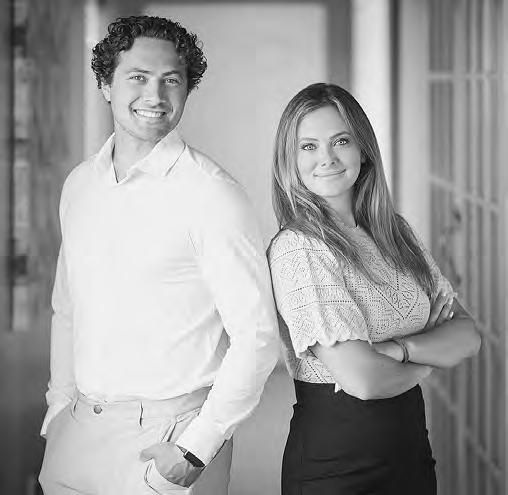

In residential areas in Israel on Saturday nights, as Shabbat ends and the new week begins, you may often come upon an outdoor evening prayer service. This is done mainly for convenience: If you have a 12-minute walk to your synagogue and there are enough interested men who are willing to commit to an outdoor service at a location three minutes from your home, then that saves you time. Plus, these outdoor services sometimes begin 10 minutes before the end of the Sabbath and are thus timed to end as the Sabbath ends (whereas synagogues tend to keep to the prim-and-proper and only start the service, which is technically the week’s first “profane” service, when the Sabbath ends). You’d be surprised at the number of Sabbath observers who, when offered the choice, prefer to get a 10-minute head start on their Motzash (post-Sabbath) activities.
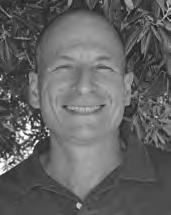
Even though it’s praiseworthy to pray in a quorum for each of the three daily services, I am ordinarily just a morningminyan person. I like starting my day by convening with a group of men for prayer, but I don’t get enough out of public afternoon or evening services to warrant the extra effort of going to a synagogue. During my year of mourning for each of my parents, I did commit to mincha and maariv services with a quorum in order to say the kaddish at all three of the daily services, but when the year ended I returned to my usual routine. However, something was different after my mourning year for my mother—I was giving up an outdoor Motzash minyan at the top of my block in Raanana. And gosh darn it, I found myself missing that Saturday-night outdoor service. There’s a nice sense of camaraderie at the minyan. Plus, after I observed a Shabbat, it felt right to mark its departure with something more ritualistic than saying the evening service alone at home. The outdoor service does what ritual is good at: by giving the Sabbath a more official ending, it better frames the Sabbath experience.
Perhaps it’s my exilic upbringing, but I sometimes wonder at the reactions of the secular people who pass us as we are praying at the Motzash minyan. Do they begrudge us the public space we are taking over for a few minutes? Are they thinking about the fact that only men are in attendance and that the presence of a woman who wanted to pray would create challenges for the group (since Orthodox prayer usually requires a physical separation of the sexes)? I would like to think that for an open-minded secular Israeli, we are part of the scenery in the Jewish State. Just like in America in November or December you might encounter a man in a Santa costume on a sidewalk ringing a bell and collecting for a charity, sometimes in Israel you come upon a group of men praying—whether it’s the afternoon service in a park or the Motzash service on Yitzhak Sadeh Street in Raanana.
The Prayer for the New Moon: Once a month, the outdoor Motzash service turns very practical—for the service known as Kiddush Levana (“sanctifying the moon”). This blessing is traditionally recited after the Saturday night service (during the first half of the month), when people still have on their nice Shabbat clothes. Kiddush Levana is said outdoors while looking at the moon (it is postponed on cloudy nights). The outdoor Motzash service saves the Kiddush Levana prayerrelocation time. If you are lucky, the Kiddush Levana you go to will conclude with people dancing slowly in a circle, singing about how God “saw and fashioned the form of the moon” and wishing each other a “good and blessed month.”
Teddy Weinberger, Ph.D., made aliyah with his wife, former Omahan Sarah Jane Ross, and their five children, Nathan, Rebecca, Ruthie, Ezra, and Elie, all of whom are veterans of the Israeli Defense Forces; Weinberger can be reached at weinross@gmail.com

(Founded in 1920)
David Finkelstein
President
Annette van de Kamp-Wright
Editor
Will Fischer
Creative Director
Claire Endelman
Sales Director
Lori Kooper-Schwarz
Assistant Editor
Sam Kricsfeld
Digital support
Mary Bachteler
Accounting
Jewish Press Advisory Board
David Finkelstein, President; Margie Gutnik, Ex-Officio; Joseph Abrahams, Helen Epstein, Andrea Erlich, Ally Freeman, Dana Gonzales, Mary Sue Grossman, Hailey Krueger, Chuck Lucoff, Sara Rips, Stewart Winograd and Bob Yaffe.
The mission of the Jewish Federation of Omaha is to build and sustain a strong and vibrant Omaha Jewish Community and to support Jews in Israel and around the world. Agencies of the JFO are: Institute for Holocaust Education, Jewish Community Relations Council, Jewish Community Center, Jewish Social Services, Nebraska Jewish Historical Society and the Jewish Press Guidelines and highlights of the Jewish Press, including front page stories and announcements, can be found online at: www.jewishomaha.org; click on ‘Jewish Press.’ Editorials express the view of the writer and are not necessarily representative of the views of the Jewish Press Board of Directors, the Jewish Federation of Omaha Board of Directors, or the Omaha Jewish community as a whole. The Jewish Press reserves the right to edit signed letters and articles for space and content. The Jewish Press is not responsible for the Kashrut of any product or establishment.
Editorial
The Jewish Press is an agency of the Jewish Federation of Omaha. Deadline for copy, ads and photos is: Thursday, 9 a.m., eight days prior to publication. E-mail editorial material and photos to: avandekamp@jewishomaha.org ; send ads (in TIF or PDF format) to: rbusse@jewishomaha.org
Letters to the Editor Guidelines
The Jewish Press welcomes Letters to the Editor. They may be sent via regular mail to: The Jewish Press, 333 So. 132 St., Omaha, NE 68154; via fax: 1.402.334.5422 or via e-mail to the Editor at: avandekamp@jewishomaha.org.
Letters should be no longer than 250 words and must be single-spaced typed, not hand-written. Published letters should be confined to opinions and comments on articles or events.
News items should not be submitted and printed as a “Letter to the Editor.”
The Editor may edit letters for content and space restrictions. Letters may be published without giving an opposing view. Information shall be verified before printing. All letters must be signed by the writer. The Jewish Press will not publish letters that appear to be part of an organized campaign, nor letters copied from the Internet. No letters should be published from candidates running for office, but others may write on their behalf.
Letters of thanks should be confined to commending an institution for a program, project or event, rather than personally thanking paid staff, unless the writer chooses to turn the “Letter to the Editor” into a paid personal ad or a news article about the event, project or program which the professional staff supervised. For information, contact Annette van de Kamp-Wright, Jewish Press Editor, 402.334.6450.
Postal The Jewish Press (USPS 275620) is published weekly (except for the first week of January and July) on Friday for $40 per calendar year U.S.; $80 foreign, by the Jewish Federation of Omaha. Phone: 402.334.6448; FAX: 402.334.5422.
Periodical postage paid at Omaha, NE. POSTMASTER: Send address changes to: The Jewish Press, 333 So. 132 St., Omaha, NE 68154-2198 or email to: jpress@jewishomaha.org
Editorials express the view of the writer and are not necessarily representative of the views of the Jewish Press Board of Directors, the Jewish Federation of Omaha Board of Directors, or the Omaha Jewish community as a whole.
The very essence of Thanksgiving is held in its name — a reminder of the importance of gratitude.
On behalf of our entire team, we want to extend our heartfelt THANKS to you, our community, for your unwavering support and dedication. Your generosity and commitment make it possible for us to strengthen Jewish life here in Omaha, provide essential services for our neighbors, and create meaningful programs that enrich our community. There is a special privilege in the work we do every day.
On this campus, you commemorate, you celebrate, you teach and learn, schmooze, get healthy, watch movies and engage with inspiring thought leaders. You exercise and bring your children to

summer camp and dance class. You watch with pride as they perform on the stage. You eat at STAR Deli and share your babies with the Pennie Z. Davis Early Learning Center. You visit your loved ones at the Rose Blumkin Jewish Home, pledge to the Annual Campaign and show up for Yom Ha’Atzmaut. You donate food items and sign up for PJ Library. You linger in the lobby, meet friends, grab a coffee and enjoy captivating art exhibitions. You learn our histories and share your stories with the Nebraska Jewish Historical Society and the Jewish
Giving thanks is one of Judaism’s core values. Thank you for being here with us and for being part of us.
Happy Thanksgiving!
Bob Goldberg
Sharon Brodkey
Teresa Drelicharz
Scott Littky
Phil Malcom
Press. You make lifelong friends and create new memories. You join advisory boards, volunteer, bond over the weather (it’s either too hot or too cold) and the Huskers. All these things are meaningful because you care. Whether through time, resources, or advocacy, you have helped ensure that our shared values of compassion, education, and cultural heritage continue to thrive. Together, we are building a vibrant, inclusive community where every individual feels connected and supported.
Thank you for standing with us and for being an integral part of this important mission. We look forward to continuing this journey together and creating a bright future for Jewish Omaha.
Mark Martin
Rachel Ring
Jane Rips
Amy Bernstein Shivvers
Chris Ulven
Annette van de Kamp-Wright
RABBI JOE SCHWARTZ
JTA
My family was never American; we were New Yorkers. My great-grandparents came from the old country to the Lower East Side as children; they moved to Harlem and to the Bronx and there they raised my grandparents. My grandparents married and moved to Great Neck, which was not yet a Jewish suburb, where my father was born and raised. And then in their 20s my parents moved back into the city, to the Upper West Side, in the late 1960s, where a few years later I was born and raised. Until the age of 46, I’d lived in New York City almost all my life.
I adore the city and everything about it. What I love most about it, I think, was what the great Jewish New Yorker Horace Kallen called its “cultural pluralism.” New York is a vast collection of different nationalities — the greatest such collection ever assembled in one place — all living together, neighborhood by neighborhood. The City (there is only this one City) and not the soulless slab of glass and concrete jutting out of Turtle Bay, is the true United Nations.
New Yorkers hail from over 150 different nations Subway signs are written in four, five, six languages; each train car some space shuttle out of Star Trek, teeming with New Yorkers of every possible complexion and dress from every corner of the globe.
So I was very moved when Mayor-elect Zohran Mamdani spoke in his acceptance speech last week of “Yemeni bodega owners and Mexican abuelas; Senegalese taxi drivers and Uzbek nurses; Trinidadian line cooks and Ethiopian aunties” all of whom, he said, had turned out to vote for him. And I was deeply moved by his vision of returning the city to its everyday, working class people, so that New York might “remain a city of immigrants: a city built by immigrants, powered by immigrants and, as of tonight, led by an immigrant.” (Whether this speech accurately reflected his actual median voter, who was more likely to be a recent college graduate living in Bushwick than a working mother of four in Flushing, is another matter.)
But as he spoke, I turned to thinking about Ibrahim, a young handsome Yemeni who ran his family bodega around the corner from my former home in Brooklyn. We used to speak about Yemen — he had strong views about which Yemeni singers
I should listen to — and how much he loved and missed it; he and his cousins would travel back there to stay for years at a time, returning to Brooklyn to earn and send remittances home. And I thought of all the Pakistani and Bangladeshi cab drivers I’ve had over the years, and how every last one of them told me about the house they’d always dreamt of building in the countryside of Pakistan or Bangladesh. And I think always of Delsie, the Jamaican woman who cared for me when my mother went back to work, who scolded and spoiled me and
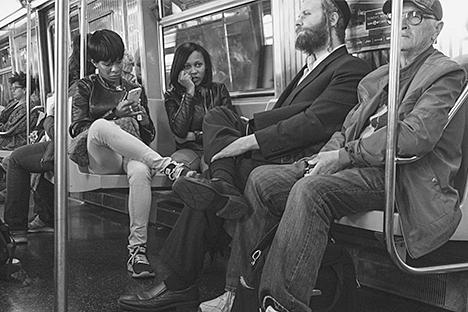
regaled me with stories about Montego Bay.
All of my fellow New Yorkers loved their home across the ocean; all of them sent money and love to their families and countrymen, sustaining that tie as much as they could.
And the Jews? Well, we were the same, but also different. For one thing, we had been in the city longer. We’d left our mark on the Lower East Side where my Chinese-Brazilian best friend lived generations ago, on its landscape and on its idiom, but we’d long moved on to other neighborhoods, as the progress of my own family demonstrates. But also, according to Horace Kallen, the Jews of his day (the 1910s) were different from the other immigrant communities of New York in the way they related to the Old Country: [Jews] do not come to the United States from truly native lands, lands of their proper nation and culture. They come from lands of sojourn, where they have been for ages treated as foreigners, at most as semi-citizens, subject to disabilities and persecutions. They come with no political aspirations against the peace of other states such as move the Irish, the Poles, the Bohemians.
They come with the intention to be completely incorporated into the body-politic of the state. . . .
Yet, once the wolf is driven from the door and the Jewish immigrant takes his place in our society a free man and an American, he tends to become all the more a Jew. The cultural unity of his race, history and background is only continued by the new life under the new conditions.
This was the position of the Jews of New York until mid-century; a “nation and culture” without a homeland to pine for.
But, of course, then the Jews — like the Irish, and the Poles, and the Czechs — regained a homeland. And fitfully, not without controversy and dissension, we, too, came to love it, and maintain a deep, unbreakable attachment to it, and seek to support it. In this, we became like the Poles and Irish and Czechs — and also like the Armenians and the Macedonians and, yes, the Palestinians, supporting “political aspirations” for our people that can rub up “against the peace of other states.” Such is the complexity of national attachments. And some of us, in fact, were so deeply attached that we left our first love, the city of our birth, to upbuild it.
I won’t argue that what Israel is to New York Jews is identical to what Yemen is to Ibrahim. The Jews’ homeland is different from other homelands, because Jewish history is different from other peoples’ history. But it’s just as precious to us. And listening to Mamdani, I wondered why his Whitmanesque reveries have no room for that attachment. I wondered why, based on his past statements, he intended not to embrace our love and grief for Israel but instead — by seeking to localize his longeststanding political priority — to turn the grievances of his Yemeni bodega owners and Mexican abuelas and Senegalese taxi drivers and Uzbek nurses and Trinidadian line cooks and Ethiopian aunties against us and against the Jewish homeland.
I realize that I am homesick for a city that was also a Jewish city, my city, that I fear is gone. And the pain that I felt when the new mayor summoned a vision of that vanished city — an ersatz vision, with no room in its heart for Jews as we really are — was a deep pain.
Rabbi Joe Schwartz is director of educational innovation at the Jewish Agency.
B’NAI ISRAEL SYNAGOGUE
618 Mynster Street Council Bluffs, IA 51503-0766
712.322.4705 www.cblhs.org
BETH EL SYNAGOGUE
Member of United Synagogues of Conservative Judaism 14506 California Street Omaha, NE 68154-1980
402.492.8550 bethel-omaha.org
BETH ISRAEL
SYNAGOGUE
Member of Union of Orthodox Jewish Congregations of America 12604 Pacific Street Omaha, NE. 68154
402.556.6288 BethIsrael@OrthodoxOmaha.org
CHABAD HOUSE
An Affiliate of Chabad-Lubavitch 1866 South 120 Street Omaha, NE 68144-1646
402.330.1800 OChabad.com email: chabad@aol.com
LINCOLN JEWISH COMMUNITY:
B’NAI JESHURUN
South Street Temple
Union for Reform Judaism
2061 South 20th Street Lincoln, NE 68502-2797
402.435.8004 www.southstreettemple.org
OFFUTT AIR
FORCE BASE
Capehart Chapel 2500 Capehart Road Offutt AFB, NE 68123
402.294.6244 email: oafbjsll@icloud.com
TEMPLE ISRAEL
Union for Reform Judaism (URJ) 13111 Sterling Ridge Drive Omaha, NE 68144-1206
402.556.6536 templeisraelomaha.com
LINCOLN JEWISH COMMUNITY:
TIFERETH ISRAEL
Member of United Synagogue of Conservative Judaism 3219 Sheridan Boulevard Lincoln, NE 68502-5236 402.423.8569 tiferethisraellincoln.org
Monthly Speaker Series Service and Hanukkah celebration, Friday, Dec. 12, 7:30 p.m. featuring the return of the Bagel Boys. Our service leader is Larry Blass. Everyone is always welcome at B’nai Israel! For information about our historic synagogue, please visit our website at www.cblhs.org or contact any of our other board members: David Alloy, Renee Corcoran, Rick Katelman, Gail Kenkel, Janie Kulakofsky, Howard Kutler, Ann Moshman, Mary-Beth Muskin, Debbie Salomon and Sissy Silber. Handicap Accessible.
Services conducted by Rabbi Steven Abraham and Hazzan Michael Krausman.
IN-PERSON AND ZOOM MINYAN SCHEDULE: Mornings on Sundays, 9:30 a.m.; Mondays and Thursdays, 7 a.m.; Evenings on Sunday-Thursday, 5:30 p.m.
FRIDAY: Six String Shabbat 6 p.m. at Beth El & Live Stream.
SATURDAY: Bar Mitzvah of Sam Kutler, 10 a.m. at Beth El and Live Stream; Jr. Congregation (Grades K12), 10 a.m.; Havdalah, 5:35 p.m. Zoom Only.
SUNDAY: BESTT (Grades K-7), 9:30 a.m.; Adult B’nai Mitzvah, 9:30 a.m. with Hazzan Krausman; Thanksgiving with St. Luke, 6 p.m. at St. Luke United Methodist Church.
TUESDAY: Mishneh Deot & Sefer HaMiddot, 10:30 a.m. with Rabbi Abraham; Board of Trustees Meeting, 7 p.m.
WEDNESDAY: No BESTT or Hebrew High Classes this week; Mincha/Ma’ariv, 5:30 p.m. Zoom Only.
THURSDAY: Office Closed; Mincha/Ma’ariv, 5:30 p.m. Zoom Only.
FRIDAY-Nov. 28: Kabbalat Shabbat 6 p.m. at Beth El & Live Stream.
SATURDAY-Nov. 29: Shabbat Morning Services, 10 a.m. at Beth El and Live Stream; Havdalah, 5:35 p.m. Zoom Only.
Please visit bethel-omaha.org for additional information and service links.
FRIDAY: Nach Yomi, 6:45 a.m.; Shacharit, 7 a.m.; Mincha/Kabbalat Shabbat/Candlelighting, 4:41 p.m.
SATURDAY: Shabbos Cafe, 8:30 a.m.; Shacharit, 9 a.m.; Tot Shabbat, 10:30 a.m.; Youth Class, 10:45 a.m.; Soulful Torah, 3:45 p.m.; Mincha 4:30 p.m.; Kids Activity/Laws of Shabbos, 5 p.m.; Havdalah, 5:45 p.m.
SUNDAY: Shacharit 9 a.m.; Mincha/Ma’ariv 4:40 p.m.
MONDAY: Nach Yomi, 6:45 a.m.; Shacharit, 7 a.m.; Monday Mind Builders, 4 p.m.; Mincha/Ma’ariv, 4:40 p.m.
TUESDAY: Nach Yomi, 6:45 a.m.; Shacharit, 7 a.m.; Mincha/Ma’ariv, 4:40 p.m.; Women’s Chaburah Class, 8 p.m.
WEDNESDAY: Nach Yomi, 6:45 a.m.; Shacharit, 7 a.m.; Mincha/Ma’ariv, 4:40 p.m.
THURSDAY: Office Closed; Shacharit, 9 a.m.; Min-
cha/Ma’ariv 4:40 p.m.
FRIDAY-Nov. 28: Office Closed; Shacharit, 9 a.m.; Mincha/Kabbalat Shabbat/Candlelighting, 4:38 p.m.
SATURDAY-Nov. 29: Shabbos Cafe, 8:30 a.m.; Shacharit, 9 a.m.; Tot Shabbat, 10:30 a.m.; Youth Class 10:45 a.m.; Soulful Torah, 3:45 p.m. with Rabbi Geiger; Mincha 4:30 p.m.; Kids Activity/Laws of Shabbos, 5 p.m.; Havdalah, 5:42 p.m.
Please visit orthodoxomaha.org for additional information and Zoom service links.
Join classes via Zoom. Go to ochabad.com/academy. For more information or to request help, please visit www.ochabad.com or call the office at 402.330.1800.
FRIDAY: Shacharit, 8 a.m.; Lechayim, 4:30 p.m., go to ochabad.com/lechayim to join; Candlelighting, 4:42 p.m.; Shabbat 100, 6 p.m. at Chabad, RSVP at ochabad.com/shabbat100
SATURDAY: Shacharit 10 a.m. followed by Kiddush and Cholent; Shabbat Ends, 5:43 p.m.
SUNDAY: Sunday Morning Wraps, 9 a.m.
MONDAY: Shacharit 8 a.m.; Personal Parsha 9:30 a.m. with Shani; Intermediate Biblical Hebrew Grammar, 10:30 a.m. with David Cohen; Parsha Reading, 6 p.m. with David Cohen; Translating Words of Prayer, 7 p.m. with David Cohen.
TUESDAY: Shacharit 8 a.m.; Aramaic Grammar, 10 a.m. with David Cohen; Intermediate Biblical Hebrew Grammar, 6 p.m. with David Cohen; Introductory Biblical Hebrew Grammar, 7 p.m. with David Cohen
WEDNESDAY: Shacharit, 8 a.m.; Introductory Biblical Hebrew Grammar, 10:30 a.m. with David Cohen; Parsha Reading, 11:30 a.m. with David Cohen.
THURSDAY: Shacharit, 8 a.m.; Advanced Biblical Hebrew Grammar, 11 a.m. with David Cohen; Talmud Study, noon; Introduction to Alphabet, Vowels & Reading Hebrew, 6 p.m. with David Cohen; Code of Jewish Law Class, 7 p.m.
FRIDAY-Nov. 28: Shacharit, 8 a.m.; Lechayim, 4:30 p.m., go to ochabad.com/lechayim to join; Candlelighting, 4:38 p.m.
SATURDAY-Nov. 29: Shacharit, 10 a.m. followed by Kiddush and Cholent; Shabbat Ends, 5:41 p.m.
LINCOLN JEWISH COMMUNITY: B’NAI JESHURUN & TIFERETH ISRAEL
Services facilitated by Rabbi Alex Felch. All services offered in-person with live-stream or teleconferencing options.
FRIDAY: Shabbat Candlelighting, 4:46 p.m.; Kabbalat Shabbat Service, 6:30-7:30 p.m. led by Rabbi Alex at SST.
SATURDAY: Shabbat Morning Service, 9:30 a.m. led by Rabbi Alex at TI; Torah Study, noon on Parashat Toldot via Zoom; Havdalah, 5:47 p.m.
SUNDAY: LJCS Classes, 9:30 a.m. at TI; Men’s Bike/ Coffee Group, 10:30 a.m. at Rock 'N' Joe Coffee, 5025 Lindberg St, Lincoln. For more information or questions please email Al Weiss at albertw801@gmail. com; Community Interfaith Thanksgiving Service, 3
p.m. at Westminster Presbyterian Church. All faiths are welcome and encouraged to attend; YJI Friendsgiving Potluck, 6 p.m. at SST. Bring a dish or beverage to share. Questions? Emial lincolnyji@gmail.com
TUESDAY: Ladies' Lunch, 1-2 p.m. Locations are decided upon at each lunch for the following month. For more information, please email Barbara Barron at oohhmmm.barb@gmail.com
WEDNESDAY: Men’s Lunch Group, 12:15 p.m. at Horisun Hospice, 8055 O St #300, Lincoln. We meet in the conference room. Bring your own lunch and beverage. For more information, contact Albert Weiss at albertw801@gmail.com; No LJCS Classes this week.
THURSDAY: Offices Closed
FRIDAY-Nov. 28: Offices Closed; Shabbat Candlelighting, 4:43 p.m.; Kabbalat Shabbat Service, 6:307:30 p.m. led by Rabbi Alex at SST. SATURDAY-Nov. 29: Shabbat Morning Service, 9:30 a.m. led by Rabbi Alex at TI; Torah Study noon on Parashat Vayeitzei via Zoom; Havdalah, 5:45 p.m.
FRIDAYS: Virtual Shabbat Service, 7:30 p.m. every first and third of the month at Capehart Chapel. Contact TSgt Jason Rife at OAFBJSLL@icloud.com for more information.
In-person and virtual services conducted by Rabbi Benjamin Sharff, Rabbi Deana Sussman Berezin, and Cantor Joanna Alexander.
FRIDAY: Drop-In Mah Jongg, 9 a.m. In-Person; Village Walking Group, 10 a.m. In-Person; Classic Shabbat Service, 6 p.m. In-Person & Zoom
SATURDAY: Torah Study, 9:15 a.m. In-Person & Zoom; Shabbat Morning Service and Bat Mitzvah of Aurelia Tindall, 10:30 a.m. In-Person & Zoom.
SUNDAY: Grades PreK-7, 9:30 a.m. In-Person; Coffee and Conversations with Board Members, 10 a.m. In-Person; Temple Tots, 10:45 a.m. In-Person; Interfaith Thanksgiving Service, 6 p.m. In-Person.
TUESDAY: Mah Jongg Made Easy, 1:30 p.m. In-Person.
WEDNESDAY: Yarn It, 9 a.m. In-Person; No Youth Learning Programs this week.
THURSDAY: Temple Israel Office Closed
FRIDAY-Nov. 28: Temple Israel Office Closed; Shabbat B’yachad Service, 6 p.m. In-Person & Zoom
SATURDAY-Nov. 29: Torah Study, 9:15 a.m. In-Person & Zoom; Shabbat Morning Service, 10:30 a.m. InPerson & Zoom.
Please visit templeisraelomaha.com for additional information and Zoom service links.
UPDATED OBITUARY CHANGES
As of July 1, 2025, Obituaries in the Jewish Press are free of charge.
For questions, please email avandekamp@ jewishomaha.org. Obituaries in the Jewish Press are included in our print edition as well as our website at www.omahajewishpress.com
PHILISSA CRAMER
JTA
President Donald Trump has made official a suggestion that he first issued on the floor of Israel’s parliament: that Prime Minister Benjamin Netanyahu should be pardoned preemptively for his alleged crimes.
Trump made the case in a letter to Israeli President Isaac Herzog that Herzog’s office released on Nov. 12. In it, Trump calls Netanyahu a “formidable and decisive War Time Prime Minister” and characterizes his prosecution as “lawfare,” a term that when used pejoratively refers to the misuse of legal systems to achieve ideological ends.
“Prime Minister Netanyahu has stood tall for Israel in the face of strong adversaries and long odds, and his attention cannot be unnecessarily diverted,” Trump writes.
He adds, “While I absolutely respect the independence of the Israeli Justice System and its requirements, I believe that this case against Bibi, who has fought alongside me for a long time, including against the very top adversary of Israel, Iran, is a political unjustified prosecution.”
The letter represents the kind of insertion into Israeli domestic politics that would have drawn ire in the past but have become relatively commonplace during Trump’s normbusting second term. It follows Trump’s successful push for Israel to strike a ceasefire deal with Hamas that freed the Israeli hostages and suspended the two-year war in Gaza, and comes as Trump is seeking to safeguard the peace. Trump says in the letter that Netanyahu’s leadership is essential for allowing Israel to move forward.
“Now that we have achieved these unprecedented successes, and are keeping Hamas in check, it is time to let him reunite Israel by pardoning him and ending this lawfare, once and for all,” Trump concludes, ending with one of his signature signoffs. “Thank you for your attention to this matter.”
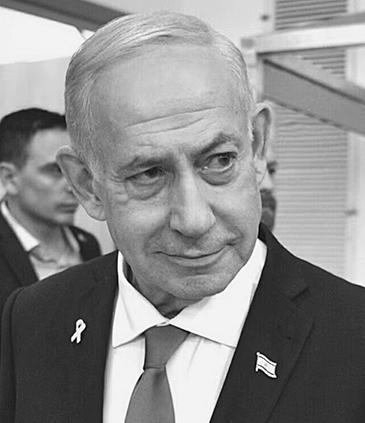
Unlike in the United States, where Trump has pardoned a number of political allies, including this week, Israel does not typically grant preemptive pardons. Netanyahu has not been convicted of any crimes. Netanyahu has three legal cases open against him, on charges of fraud, bribery and breach of trust. They relate to allegations that he accepted lavish gifts in exchange for political favors and that he used his position to secure positive media coverage. The trial in the cases began in 2020 and has proceeded in fits and starts, with hearings routinely canceled as Netanyahu attends to Israel’s affairs, including the multi-front war and a protest movement that Netanyahu and his allies allege has been stoked through foreign interference.
was edited for length.
ASAF ELIA SHALEV JTA
For years, synagogue leaders have said they can’t find enough clergy to fill their pulpits, leading to warnings of a nationwide rabbinic shortage. At the same time, openings for campus rabbis at Hillel chapters draw an average of 19 applicants each.
This mismatch between what rabbis want to do and the kinds of jobs available is among the many findings in the firstever empirical study of the American rabbinate across denominations, released this week by the Atra Center for Rabbinic Innovation.
The study also examines the so-called “rabbinic pipeline” — the concern that declining enrollment at seminaries means too few people want to become rabbis. Here, too, the findings challenge conventional wisdom.
Surveying 450 people who considered the rabbinate but chose other careers, the study finds that lack of motivation was not a deciding factor. The most common barriers cited were the cost and duration of rabbinical school, the need to relocate, and concerns about the practicality of such a career. In addition to these “would-be” rabbis, researchers surveyed nearly 1,500 others — including working and retired rabbis, current students, and seminary dropouts. They also interviewed leaders of rabbinical schools and associations, along with representatives of a wide range of rabbinic employers, while collecting recruitment and enrollment data.
Almost as notable as the findings is the diversity of those who took part. Participating organizations include every rabbinic institution from Reconstructionist and Reform to Conservative and Modern Orthodox, as well as all major non-denominational programs. Participation also came from umbrella groups representing Jewish summer camps, community centers, federations, and Hillel chapters. (Haredi Judaism was outside the study’s scope.)
“It’s a groundbreaking effort because there’s never been a comprehensive study of the rabbinate before, but it didn’t take much persuasion to get broad participation,” Atra’s executive director, Rabbi Shira Koch Epstein, said in an interview.
The report’s origin can be traced to a 2022 sermon by Rabbi Elliot Cosgrove of Park Avenue Synagogue, which called attention to the rabbinic pipeline problem. Among those who took his message to heart was philanthropist Heather Baker. As she began investigating, she discovered that there was no data on which to draw, so she decided to spearhead an effort that culminated in Atra’s new report.
Epstein described an eagerness to get involved that was motivated by years of debate about the issues addressed in the study. In one breakthrough, Atra convened dozens of leaders of institutions and programs that cultivate Jewish leaders and ordain rabbis, spanning the denominational range, for a brainstorming session about tackling the rabbinic pipeline.
“Everyone’s been trying to address the problems and the challenges, and we haven’t actually had any shared good information and data to help us do that,” Epstein said. “People actually want to work together on this, because they recognize that no one can do it alone.”
The study does not offer hard and fast solutions, instead positioning itself as a “mirror and a map” for collective action. Here are some of the highlights.
1. Only about half of all rabbis work in synagogues. Those who do tend to find their job overly stressful and exhausting. Other kinds of rabbinical jobs offer much higher job satisfaction.
About 56% of rabbis are in pulpit jobs. The rest work for nonprofits, as chaplains, for day schools and universities or as independent entrepreneurs. The researchers spoke to 222 people who have held jobs in both categories. They said that working for a synagogue pays better but that, by every other metric of job satisfaction, working outside the synagogue is significantly better.
The study highlights this difference but also notes with a tone of reassurance and awe that 97% of all rabbis said their jobs are rewarding.
2. After years of decline, rabbinical school enrollment appears to be stabilizing.
The widespread perception that the major denominational
seminaries are graduating fewer students while newer and non-denominational schools are growing is validated in the study. The latter are now producing slightly more rabbis than the former. Over the past five years, enrollment declines at Conservative and Reform seminaries have stopped, suggesting that a new normal has been reached.
3. Most rabbinical students are women and most are LGBTQ. Many are converts.
Rabbinical students today reflect a far more diverse cohort than in the past. According to the Atra report, 58% identify as women, 30% as men, and 12% as nonbinary.
An estimated 51% identify as LGBTQ, a contrast made starker with survey data collected in the same study showing that only 15% of rabbis ordained 10 to 20 years ago are LGBTQ. Meanwhile, 16% of rabbinical students are Jews by choice and 12% identify as a race other than white.
Both Atra and the researchers they commissioned to carry out the study caution against drawing sensational conclusions about the growing diversity.
“There’s no data-driven evidence as to why it’s happening and what the implications of it are yet to be known,” Wendy Rosov, the study’s lead researcher, said in an interview.
4. Views about Israel or Zionism don’t factor heavily into decisions about whether to become a rabbi.
The past few years have seen some students drop out of rabbinical school in protest of what they say is anti-Zionism in the student body and dozens of students signing on to petitions that are harshly critical of Israel.
Atra didn’t collect data on how current and future rabbis feel about Israel. But it did check how whatever view they held factored into their motivation for the job. Only a small minority said they wanted to become rabbis as a way to promote Israel and an even smaller minority said they were worried about being silenced regarding their criticism of Israel.
The motivating factors people most often checked often were “a desire to serve others,” “I felt called by my love of Judaism,” “An interest in deepening their knowledge of Jewish text and traditions,” and “a desire to teach.”
5. A wave of rabbinic retirements is looming.
The Atra report estimates there are about 4,100 rabbis currently working across congregations, schools, nonprofits, campuses, and chaplaincies. But the profession is getting older only 6% are under 35, while a quarter are over 65.
With most rabbis ordained in their mid-30s and many staying in their roles for decades, the report warns that retirements may soon outnumber new entrants unless younger Jews are drawn into the field.
The report closes on a note of cautious optimism, calling for collective action rather than quick fixes. It outlines nine areas where collaboration could make the biggest difference — from easing the financial burden of rabbinical training to modernizing education, expanding non-congregational careers, and improving mentorship. Epstein is hopeful that the collaborative spirit embodied in the summer gathering could translate into shared solutions.
“This is a surmountable challenge,” she said.




CLASSIFIED ADVERTISING works! Place your 25 word ad into thousands of Nebraska homes for $225. Contact the Jewish Press or call 1-800-369-2850.
HELLO NEBRASKA! Introducing www.nepublicnotices.com, a new public notice website presented as a public service by all Nebraska newspapers. Free access, fully searchable – because democracy depends upon open government and your right to know.
BANKRUPTCY RELIEF! Help stop Creditor Harassment, Collection Calls, Repossession and Legal Actions! Speak to a Professional Attorney and Get the Help You NEED! Call NOW 844-215-3629
AFFORDABLE PRESS Release service. Send your message to 155 newspapers across Nebraska for one low price! Call 1-800369-2850 or www.nebpress.com for more details.
DENTAL INSURANCE from Physicians Mutual Insurance Company. Coverage for 350 plus procedures. Real dental insuranceNOT just a discount plan. Do not wait! Call now! Get your FREE Dental Information Kit with all the details! 1-855-490-4149 www.dental50plus.com/81 #6258
GET DISH Satellite TV + Internet! Free Install, Free HD-DVR Upgrade, 80,000 On-Demand Movies, Plus Limited Time Up To $600 In Gift Cards. Call Today! 1-877-688-4784
PREPARE FOR power outages today with a Generac Home Standby Generator. Act now to receive a FREE 5-Year warranty with qualifying purchase. Call 1-402-899-2584 today to schedule a free quote. It’s not just a generator. It’s a power move. DOES YOUR basement or crawl space need some attention? Call Thrasher Foundation Repair! A permanent solution for waterproofing, failing foundations, sinking concrete and nasty crawl spaces. FREE Inspection & Same Day Estimate. $250 off ANY project with code GET250. Call 1-844-958-3431
SERVICES - PUBLISHING
BECOME A Published Author. We want to Read Your Book! Dorrance Publishing-Trusted by Authors Since 1920 Book manuscript submissions currently being reviewed. Comprehensive Services: Consultation, Production, Promotion and Distribution Call for Your Free Author`s Guide 1-877-858-2822 or visit dorranceinfo.com/Nebraska
WANTED TO BUY
WE BUY 8,000 cars a week. Sell your old, busted or junk car with no hoops, haggles or headaches. Sell your car to Peddle. Easy three step process. Instant offer. Free pickup. Fast payment.
LARRY LUXNER
ROSWELL, New Mexico | JTA
If it weren’t for an Ashkenazi Jew named Stanton T. Friedman, the world might have long ago forgotten what’s come to be known simply as the “Roswell incident.”
Instead, countless books, documentaries and made-for-TV dramas have explored the 1947 discovery of mysterious materials found on a New Mexico ranch that Friedman argued were the relics of extraterrestrials. A wave of successors, including a prominent Israeli-American physicist, continue to press the case for alien contact. And this dusty desert town has been transformed according to an unusual paradox: It’s shaped by conspiracy theories, yet is home to virtually no Jews.
Roswell’s only synagogue, Congregation B’nai Israel, closed up and moved to Albuquerque five years ago.
“They didn’t have a rabbi and they only met twice a month, on Fridays,” said Leslie Lawner, who made the move with her husband in 2020, reducing Roswell’s tiny Jewish population by two. “There was really nothing we could do for them.”
The Lawners left behind a town that is largely defined by what happened in the summer of 1947, when local rancher W.W. “Mac” Brazen found rubber strips, tin foil, thick paper and other debris on his property and shared the material with Sheriff George Wilcox of Roswell. The sheriff brought the unusual artifacts to the attention of the Roswell Army Air Field, which on July 9 of that year announced that it had recovered the remains of a “flying disc.”
The outrageous RAAF claim was quickly denounced as erroneous by local military officials who said the debris was actually the wreckage of a crashed weather balloon and related equipment.
That would have been the end of it, if not for Friedman, a nuclear physicist and highly regarded “ufologist” who revisited the incident in the 1970s, devoting the rest of his life to proving the
existence of flying saucers. In 1987, Friedman — who died six years ago — told the New York Times that federal officials had engaged in a “cosmic Watergate” to cover up the truth. Now, this remote city of 47,000, located east of the White Sands Missile Range and about a three-hour drive southeast of Albuquerque, is known for one thing and one thing only: flying saucers.

Those saucers are ubiquitous — beginning with one atop the “Welcome to Roswell” sign east of town along U.S. 380. There’s also a UFO-shaped McDonald’s, along with a bug-eyed little green alien relaxing under an umbrella in front of the nearby Western Inn.
Another extraterrestrial creature reclines on a bed in the display window of White Mattress, not to mention yet another, even more tacky, E.T. proudly holding up the Dunkin Donuts marquee along Main Street. Not surprisingly, Martians are a common theme in Halloween displays here.
In 1997, the Air Force — attempting to dispel rumors that had persisted for decades — released a 231-page report concluding that alien bodies recovered at the Roswell crash site weren’t aliens at all, but dummies used in parachute tests. It
also said that the “spacecraft” that had fallen to Earth on Brazen’s ranch was really an Air Force balloon used in a topsecret program code-named Project Mogul to monitor the atmosphere for evidence of Soviet nuclear tests.
Asked at the time if the new report would finally put the matter to rest, retired Air Force Col. Richard Weaver told NBC’s Today show: “No, I doubt it. This has become a religion to many people. It’s almost a cult. Certainly, an unbelievable financial opportunity for many folks. So I think this is going to endure.”
Now, the town has taken on added prominence with the Pentagon’s recent establishment of an All-Domain Anomaly Resolution Office. President Donald Trump is a known skeptic of UFOs.
In a town forged around the religion of aliens, Jewish life is virtually nonexistent. There aren’t enough Jews here to make a minyan — let alone support a synagogue — and the few who did live here have mostly died off or moved away. The obsession with aliens has divided Jewish voices. An Orthodox Jewish rabbinical authority, Rabbi Pini Dunner of Beverly Hills, California, has called the Roswell incident “nonsense.” But some Jews are attached to the idea that aliens are out there — including one of the most prominent scientists making the case today. The Israeli-American physicist Avi Loeb, who runs a lab at Harvard University, argues that some objects and phenomena in space cannot be explained except as evidence of extraterrestrial technology.
So what do the handful of Jews remaining in Roswell think about the 1947 “incident” that made their town famous?
“My husband is from a ranching family with longtime roots in this area, and all of their ranch neighbors strongly believe it is not a hoax,” one Jewish resident said. “There was an incident, and a government cover-up. Both of us are scientists, and we’re not shrugging it off as ridiculous.”
Read more at omahajewishpress.com
